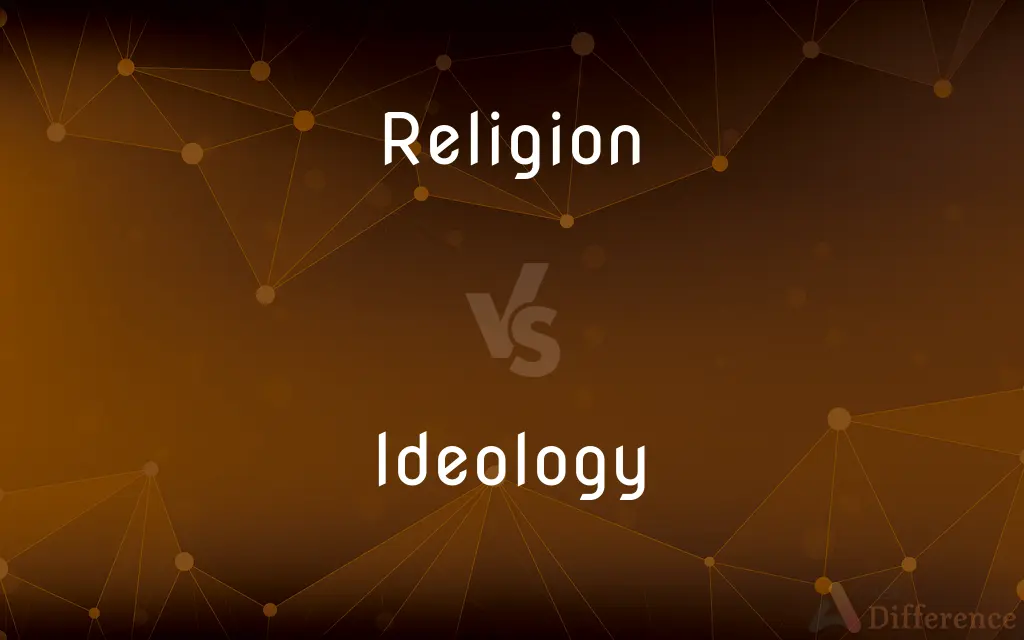Religion vs. Ideology — What's the Difference?
By Tayyaba Rehman — Updated on October 27, 2023
Religion is a system of beliefs centered around a higher power or deity, while ideology is a set of ideas and principles guiding actions and policies.

Difference Between Religion and Ideology
Table of Contents
ADVERTISEMENT
Key Differences
Religion primarily revolves around faith, spirituality, and practices related to a higher power or deity. Ideology, on the other hand, is an organized collection of ideas that forms the basis of economic, political, or social theories and policies.
Religion often originates from ancient scriptures, divine revelations, or spiritual traditions passed down through generations. Ideology, however, is typically rooted in philosophical, political, or societal thought, and can evolve over time based on prevailing circumstances.
Religion serves to provide moral guidance, a sense of purpose, and a connection to the divine or spiritual realm. Ideology offers a framework for understanding, interpreting, and influencing societal structures, governance, and individual behavior.
Adherents of a religion often identify with a specific faith, participate in rituals, and seek spiritual enlightenment. Proponents of an ideology align themselves with particular ideas or principles and advocate for their implementation in societal structures.
While many religions have core tenets that remain unchanged, interpretations can vary. Ideologies can be more malleable, adjusting to societal changes, new information, or different interpretations.
ADVERTISEMENT
Comparison Chart
Source
Often rooted in ancient scriptures or divine revelations.
Typically stems from philosophical or political thought.
Primary Focus
Faith, spirituality, connection to the divine.
Ideas and principles guiding societal actions and policies.
Moral Guidance
Provides moral and ethical codes for followers.
May or may not have a moral component, depending on the ideology.
Flexibility
Interpretations can vary, but core tenets are often fixed.
More malleable and can adjust over time.
Adherence
People identify with a faith, partake in rituals, seek enlightenment.
People align with ideas or principles and advocate for societal changes.
Compare with Definitions
Religion
A specific set of fundamental beliefs and practices agreed upon by a group.
The religion of ancient Egyptians revolved around the sun god Ra.
Ideology
A doctrine, myth, or belief system governing an individual or group.
The ideology of that cult is quite controversial.
Religion
A system of beliefs and practices regarding the divine and the sacred.
Christianity is a major religion practiced worldwide.
Ideology
A system of ideas and ideals that forms the basis for economic, political, or social theory.
Capitalism is an economic ideology.
Religion
Religion is a social-cultural system of designated behaviors and practices, morals, beliefs, worldviews, texts, sanctified places, prophecies, ethics, or organizations, that relates humanity to supernatural, transcendental, and spiritual elements; however, there is no scholarly consensus over what precisely constitutes a religion.Different religions may or may not contain various elements ranging from the divine, sacred things, faith, a supernatural being or supernatural beings or "some sort of ultimacy and transcendence that will provide norms and power for the rest of life". Religious practices may include rituals, sermons, commemoration or veneration (of deities and/or saints), sacrifices, festivals, feasts, trances, initiations, funerary services, matrimonial services, meditation, prayer, music, art, dance, public service, or other aspects of human culture.
Ideology
An integrated set of opinions or beliefs that influence actions.
The company's ideology prioritizes sustainability.
Religion
The belief in and reverence for a supernatural power or powers, regarded as creating and governing the universe
Respect for religion.
Ideology
A vision or way of thinking about the world, especially from a political perspective.
The senator's ideology is evident in her voting record.
Religion
A particular variety of such belief, especially when organized into a system of doctrine and practice
The world's many religions.
Ideology
A set of beliefs or principles held by a group or individual.
His ideology emphasizes environmental conservation.
Religion
A set of beliefs, values, and practices based on the teachings of a spiritual leader.
Ideology
An ideology (/ˌʌɪdɪˈɒlədʒi/) is a set of beliefs or philosophies attributed to a person or group of persons, especially as held for reasons that are not purely epistemic, in which "practical elements are as prominent as theoretical ones." Formerly applied primarily to economic, political, or religious theories and policies, in a tradition going back to Karl Marx and Friedrich Engels, more recent use treats the term as mainly condemnatory.The term was coined by Antoine Destutt de Tracy, a French Enlightenment aristocrat and philosopher, who conceived it in 1796 as the "science of ideas" to develop a rational system of ideas to oppose the irrational impulses of the mob. In political science, the term is used in a descriptive sense to refer to political belief systems.
Religion
The life or condition of a person in a religious order
A widow who went into religion and became a nun.
Ideology
A set of doctrines or beliefs that are shared by the members of a social group or that form the basis of a political, economic, or other system.
Religion
A cause, principle, or activity pursued with zeal or conscientious devotion
A person for whom art became a religion.
Ideology
Doctrine, philosophy, body of beliefs or principles belonging to an individual or group.
A dictatorship bans things, that do not conform to its ideology, to secure its reign.
Religion
(uncountable) Belief in a spiritual or metaphysical reality (often including at least one deity), accompanied by practices or rituals pertaining to the belief.
My brother tends to value religion, but my sister not as much.
Ideology
(uncountable) The study of the origin and nature of ideas.
Religion
(countable) A particular system of such belief, and the rituals and practices proper to it.
Belief system
Islam is a major religion, particularly in North Africa and Southwest Asia.
Mormonism is a new religion, while Zoroastrianism is an old one.
Ideology
The science of ideas.
Religion
(uncountable) The way of life committed to by monks and nuns.
The monk entered religion when he was 20 years of age.
Ideology
A theory of the origin of ideas which derives them exclusively from sensation.
Religion
Rituals and actions associated with religious beliefs, but considered apart from them.
I think some Christians would love Jesus more if they weren't so stuck in religion.
Jack's spiritual, but he's not really into religion.
Ideology
A set or system of theories and beliefs held by an individual or group, especially about sociopolitical goals and methods to attain them; in common usage, ideology is such a set of beliefs so strongly held by their adherents as to cause them to ignore evidence against such beliefs, and thus fall into error - in this sense it is viewed as a negative trait; contrasted to pragmatism, and distinct from idealism.
Religion
(countable) Any practice to which someone or some group is seriously devoted.
At this point, Star Trek has really become a religion.
Ideology
An orientation that characterizes the thinking of a group or nation
Religion
Faithfulness to a given principle; conscientiousness.
Ideology
Imaginary or visionary theorization
Religion
Engage in religious practice.
Religion
Indoctrinate into a specific religion.
Religion
To make sacred or symbolic; sanctify.
Religion
The outward act or form by which men indicate their recognition of the existence of a god or of gods having power over their destiny, to whom obedience, service, and honor are due; the feeling or expression of human love, fear, or awe of some superhuman and overruling power, whether by profession of belief, by observance of rites and ceremonies, or by the conduct of life; a system of faith and worship; a manifestation of piety; as, ethical religions; monotheistic religions; natural religion; revealed religion; the religion of the Jews; the religion of idol worshipers.
An orderly life so far as others are able to observe us is now and then produced by prudential motives or by dint of habit; but without seriousness there can be no religious principle at the bottom, no course of conduct from religious motives; in a word, there can be no religion.
Religion [was] not, as too often now, used as equivalent for godliness; but . . . it expressed the outer form and embodiment which the inward spirit of a true or a false devotion assumed.
Religions, by which are meant the modes of divine worship proper to different tribes, nations, or communities, and based on the belief held in common by the members of them severally. . . . There is no living religion without something like a doctrine. On the other hand, a doctrine, however elaborate, does not constitute a religion.
Religion . . . means the conscious relation between man and God, and the expression of that relation in human conduct.
After the most straitest sect of our religion I lived a Pharisee.
The image of a brute, adornedWith gay religions full of pomp and gold.
Religion
Specifically, conformity in faith and life to the precepts inculcated in the Bible, respecting the conduct of life and duty toward God and man; the Christian faith and practice.
Let us with caution indulge the supposition that morality can be maintained without religion.
Religion will attend you . . . as a pleasant and useful companion in every proper place, and every temperate occupation of life.
Religion
A monastic or religious order subject to a regulated mode of life; the religious state; as, to enter religion.
A good man was there of religion.
Religion
Strictness of fidelity in conforming to any practice, as if it were an enjoined rule of conduct.
Those parts of pleading which in ancient times might perhaps be material, but at this time are become only mere styles and forms, are still continued with much religion.
Religion
A strong belief in a supernatural power or powers that control human destiny;
He lost his faith but not his morality
Religion
Institution to express belief in a divine power;
He was raised in the Baptist religion
A member of his own faith contradicted him
Religion
A pursuit or interest followed with great devotion.
For some, music is a religion.
Religion
An institution that expresses shared beliefs and conducts communal worship.
The local religion emphasizes community service.
Religion
A moral code that guides an individual's life.
Kindness is at the core of her religion.
Common Curiosities
Can an ideology have religious elements?
Yes, some ideologies can incorporate religious beliefs or principles.
Are all religions based on the belief in a deity?
No, not all religions revolve around a deity; some focus on spirituality, moral principles, or life philosophies.
How does ideology differ from religion in its origin?
Ideology stems from philosophical or political thought, while religion often originates from ancient scriptures or divine revelations.
Can a person have multiple ideologies?
Yes, a person can hold multiple ideologies, especially if they pertain to different aspects of life, like politics, economics, and social issues.
What is the primary focus of religion?
Religion focuses on faith, spirituality, and connection to the divine.
Are ideologies always political?
No, ideologies can be economic, social, cultural, or political in nature.
How do religions typically spread?
Religions spread through missionary work, cultural exchange, conquests, and familial or societal teachings.
Can ideologies exist without formal documentation?
Yes, ideologies can be based on shared beliefs or principles without formal documentation.
Can religions change over time?
Yes, interpretations and practices within religions can evolve over time based on societal changes or new interpretations.
Are religions always organized?
While many religions have organized structures, some individuals practice spirituality or hold beliefs outside of organized religion.
How do religious institutions influence societies?
Religious institutions can shape moral values, cultural norms, and communal bonds within societies.
Is atheism a religion or ideology?
Atheism is typically considered a lack of belief in deities, making it neither a religion nor an ideology in the traditional sense.
How do ideologies influence political movements?
Ideologies provide frameworks for political movements, guiding their objectives, methods, and goals.
How do ideologies shape societies?
Ideologies can influence laws, policies, cultural norms, and societal structures.
Can one ideology be dominant in a society?
Yes, societies often have dominant ideologies that influence major aspects of life, though multiple ideologies can coexist.
Share Your Discovery

Previous Comparison
Duration vs. Length
Next Comparison
Bioreactor vs. FermenterAuthor Spotlight
Written by
Tayyaba RehmanTayyaba Rehman is a distinguished writer, currently serving as a primary contributor to askdifference.com. As a researcher in semantics and etymology, Tayyaba's passion for the complexity of languages and their distinctions has found a perfect home on the platform. Tayyaba delves into the intricacies of language, distinguishing between commonly confused words and phrases, thereby providing clarity for readers worldwide.














































